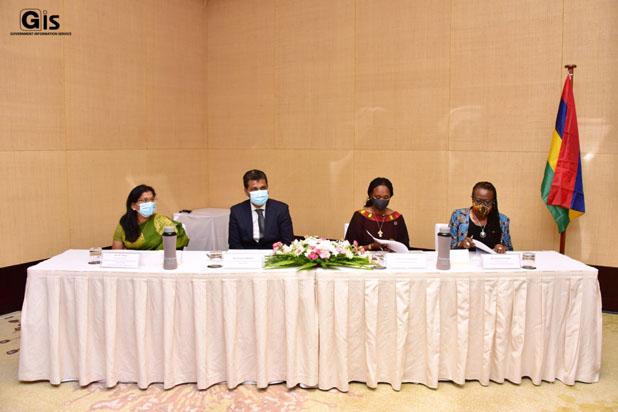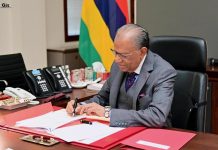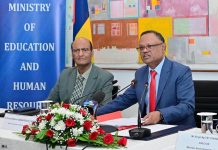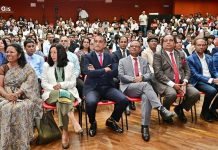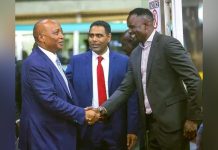Africa-Press – Mauritius. A National Validation Workshop on the revised National Oil Spill Contingency Plan (NOSCP), organised by the Ministry of Environment, Solid Waste Management and Climate Change, opened this morning at the Westin Turtle Bay Resort & Spa, in Balaclava.
The aim is to examine the revised NOSCP prepared with the assistance of Mr Matthew Sommerville, International Oil Spill Expert, following a series of consultations with stakeholders.
The Minister of Environment, Solid Waste Management and Climate Change, Mr Kavydass Ramano, the United Nations Resident Coordinator, United Nations Resident Coordinator’s Office (UNRCO), Mrs Christine Umutoni, the United Nations Development Programme’s (UNDP) Resident Representative for Mauritius and Seychelles, Ms Amanda Serumaga, and other personalities were present.
The changes being brought about in the new NOCP are as follows: the scope now comprises the Republic of Mauritius that is the Mauritius, Rodrigues, Agalega, Tromelin, Cargados Carajos and the Chagos Archipelago, including Diego Garcia; the spill tiered response concept is more elaborated compared to the old one; the potential impact of the pollutant is now being taken into consideration in setting up the initial response level, rather than only the volume spilled; and the incident command structure has been improved to allow for rapid decision making and include the Polluter representative, Technical Advisors, a Legal Advisor and a Health and Safety Officer.
In his keynote address, the Minister observed that the demand for global trade is driving huge growth in ship traffic in the world’s oceans. Half of the world’s container ships, one third of the world’s bulk cargo traffic and two thirds of the world’s oil shipments cross the Indian Ocean waters annually, he indicated.
The shipping lanes along the East African coast, he said, are among the busiest in the world, carrying over 30% of the world’s crude oil supplies, and annually around 35 000 marine vessels pass by the coasts of Mauritius. Being located in such a heavy maritime route, the country is exposed to the risk of oil spills or any similar incidents, he pointed out.
The Wakashio oil spill incident, recalled Mr Ramano, resulted in immediate environmental, economic and social consequences, however, most of these impacts were promptly mitigated with the effort of responders and on–scene commanders and also due to the fact that the country already had a NOSCP.
According to him, the implementation of the Plan to such a level demonstrated its limits that is what was working and what needs improvement. Lessons learnt from the Wakashio incident have shown that a number of additional elements need to be considered with regard to this preparedness framework, especially in dealing with major oil spill beyond Tier 1 (i.
e. spills above 10 metric tonnes), he emphasised. Moreover, the Minister highlighted that in the light of these lessons learnt, major increase in maritime traffic in the region and the changing climatic conditions it thus became imperative to review the current NOSCP for better preparedness and response in the future.
Actions, noted the Mr Ramano, were accordingly initiated by the Ministry in collaboration with the UNDP and the UNRCO to seek the services of an experienced consultant to, amongst others, review the Port-Louis Harbour Oil Spill Response Plan; finalise the Rodrigues Oil Spill Contingency Plan; and finalise the draft Dispersant Policy.
The NOSCP document, he underscored, has now been updated with the active collaboration of stakeholders. At the same time, it remains a living document which can be further updated in light of recommendations to be made by the Court of Investigation, which was set up to look into the Wakashio incident, he added.
As for Mrs Umutoni, she underlined that one of the recommendations of the crisis committee was to upgrade and review the oil spill contingency plan and the support is coming from the UNDP and the UNRCO through an emergency fund which was put together by the Regional Director.
This particular work is addressing the needs and priorities of the country in terms of better preparedness if there was another oil spill and fits in the wider plan of the Government for disaster risk management and preparedness but also in the wider context of managing the climate change related issues, she underlined.
For her part, Ms Serumaga, spoke about how the MV Wakashio oil spill demonstrated the capabilities and strengths of the united Mauritian population who worked together to limit the damage caused and to assist those directly affected by this disaster.
The UNDP Country Office is pleased to have contributed to various consultative processes with regards to the review of the contingency plan which demonstrates a commitment to protect the people and natural assets from the adverse impacts of pollution through an efficient, inclusive and structured coordinated approach, she remarked.
In a statement, Mr Sommerville said that the contingency plan has been revised not to address specifically the Wakashio oil spill, but to position Mauritius for the future, and the new document will be easier to update and developed.
One of the big changes in the new plan is that it is looking not just at oil but takes on board on all types of pollution that might need to be managed regardless of where they come from, he added.
National Oil Spill Contingency Plan
The NOSCP, prepared in 2003, provides the organisational structure and procedures for preparedness and response to oil spills.
The aim of the Plan is to maintain a national integrated Government/Industry organisational framework capable of effective and prompt response to oil pollution incidents in the territorial waters and exclusive economic zone of Mauritius.
As the NOSCP dates back as far as 2003 it was imperative to review the document especially with emerging issues such as new institutional arrangements, changing climatic conditions, evolving technologies and techniques, state-of-art equipment and international best practices in respect of oil spill and heightened risks with the increase in maritime traffic, lessons learnt following the MV Wakashio wreck and oil spill.
In that respect, in May 2021, the Ministry of Environment, Solid Waste Management and Climate Change, in collaboration with the UNDP Country Office, availed the services of Mr Sommerville, to assist, inter alia, in the review of the NOSCP while also taking into consideration the outer islands of Agalega and St Brandon, make recommendations on the atlas of sensitive coastal regions and develop and carry out a capacity-building programme.
For More News And Analysis About Mauritius Follow Africa-Press


